While the graduate trainees at Cambridge libraries work together on this website and attend a coordinated programme of events, we all work for different libraries. As these are training positions there is a lot of similarity between our everyday tasks, but there are also individual duties and projects for each trainee. Each library has its own atmosphere and particular advantages.
Newnham College Library: The Job
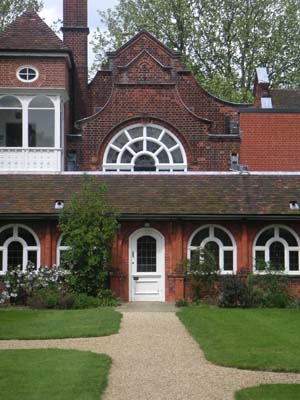 As part of a small team, the graduate trainee at Newnham is given the opportunity to undertake a range of tasks and be involved in all aspects of library work. The main duties include:
As part of a small team, the graduate trainee at Newnham is given the opportunity to undertake a range of tasks and be involved in all aspects of library work. The main duties include:
- Dealing with enquiries and helping students.
- Looking after the loans and returns on a daily basis: returning books and re-shelving them, dealing with reservations, etc.
- Labelling and processing new books once they have been catalogued.
- Ordering books, and receiving them when they arrive in the library.
- Classification and cataloguing of new books.
- Checking and pricing reading lists.
- De-accessioning withdrawn volumes. Once volumes have been withdrawn from the catalogue, removing bookplates and labels, stamping with withdrawn stamp, etc.
- Processing book donations once they have been approved for receipt.
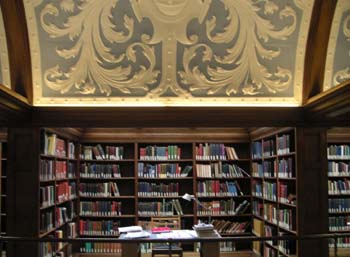 The trainee is given extensive training at the start of the year, both in-house and at courses run by the University Library. Training continues throughout the year, with the opportunity to develop skills through various courses, and there is the programme of visits organised. A typical day will start with emptying the book drops, returning and reshelving the books. The rest of the day will be spent doing any combination of the jobs above.
The trainee is given extensive training at the start of the year, both in-house and at courses run by the University Library. Training continues throughout the year, with the opportunity to develop skills through various courses, and there is the programme of visits organised. A typical day will start with emptying the book drops, returning and reshelving the books. The rest of the day will be spent doing any combination of the jobs above.
The trainee is also able to undertake project work in areas of particular interest. Recent projects have included sorting and cataloguing donations in a range of subject areas; assisting with displays and exhibitions, and assiting with stock review and catalogue editorial work.
Visit Newnham College Library website.
top
Pembroke College – Library: The Job
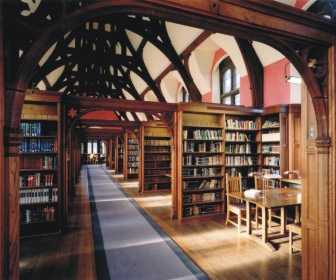
Undergraduate teaching and learning is at the heart of Pembroke College Library’s purpose, and so the teaching collection comprises core texts for all undergraduate subjects from Architecture to Zoology. Most subjects are covered by more than just the core texts, and some subjects are particularly well-represented, such as English and Art.
In addition to the teaching collection, the Library is home to the majority of the College’s collection of archives and early printed books and regularly hosts researchers from all over the world.
The Graduate Trainee is part of a small team that maintains the Library and delivers the services that the College requires. The main tasks involved in the role include:
- Supporting students and other readers by providing Library inductions, answering enquiries, and ensuring the Library remains a comfortable working environment;
- Processing and cataloguing books being added to or removed from the collections, including supervised cataloguing of rare books;
- Contributing to on-going and new Library projects, which may include anything from updating the collection management policy to book moving.
The role also provides the opportunity to work with the Library’s special collections materials on a more in-depth basis, as the Trainee also will have the opportunity to engage in a personal project based on an item or items from those collections.
As with the other trainee posts in Cambridge, training is continuous throughout the year. Ad hoc training is provided during the course of the Trainee’s duties; more specialized training is provided centrally. There is scope for additional training based on the interests of each Trainee. The Trainee will also have the opportunity to participate in a series of arranged visits to other libraries both in Cambridge and beyond.
Visit the Pembroke College Library webpage.
top
Queens’ College Library: The Job
Queens’ College Library is composed of the War Memorial Library (the student library) and the Old Library, a 15th century purpose-built library which remains very close to its original state. The War Memorial Library was once the old chapel and has three floors.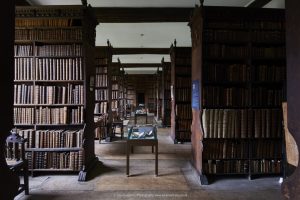
It is an exciting time to be part of Queens’ Library as in 2016 it was given funding by the Heritage Lottery Fund to catalogue its 16th-century books and conduct outreach. The trainee is part of a small team of five members of staff, including a HLF project associate, and a few volunteers. There are lots of opportunities to attend training and take part in visits to other libraries. The trainee is encouraged to develop their own interests and will put on their own exhibition, as well as participating in the HLF-funded exhibitions. The trainee’s schedule involves moving about from task to task during the day, and the trainee will balance many different aspects of library work daily as part of a busy academic library with lots of things happening such as workshops, outreach, exhibitions, and events.
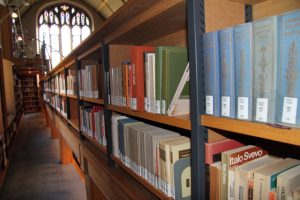
Specific Tasks
- Regular shifts at the library enquiry desk, including issuing, returning and renewing stock and registering users on the Voyager library management system, and answering queries from staff, students and visiting researchers.
- Shelving, tidying and weeding stock, book moving.
- Checking reading lists, liaising with other staff as required in order to update stock.
- Cataloguing and classifying modern printed books using MARC21, RDA (and AACR2 when appropriate), LCSH, and the Bliss classification scheme.
- Processing stock and carrying out basic repairs.
- Carrying out induction tours for students and helping with information skills workshops.
- Assisting with the library’s social media, the website, newsletters, and any other communications.
- Contributing to the Old Library blog.
- Assisting with the setup, publicity, and curation of exhibitions in the Old Library (normally two per year, one of which is assembled primarily by the Graduate Trainee), book display case in the War Memorial Library, and helping with other events aimed at utilising and raising awareness of the College’s special collections, such as Open Cambridge.
- Assisting with the college’s Heritage Lottery-funded project to catalogue and publicise its Renaissance collections. Generally duties involve doing schools/public outreach, mounting book displays, cataloguing, creating a website, and communications.
- Invigilation of researchers consulting materials from the special collections and those visiting exhibitions in the Old Library.
- Undertaking any other duties or specific projects as requested by the College Librarian.
Visit Queens’ College Library webpage.
top
St John’s College Library: The Job
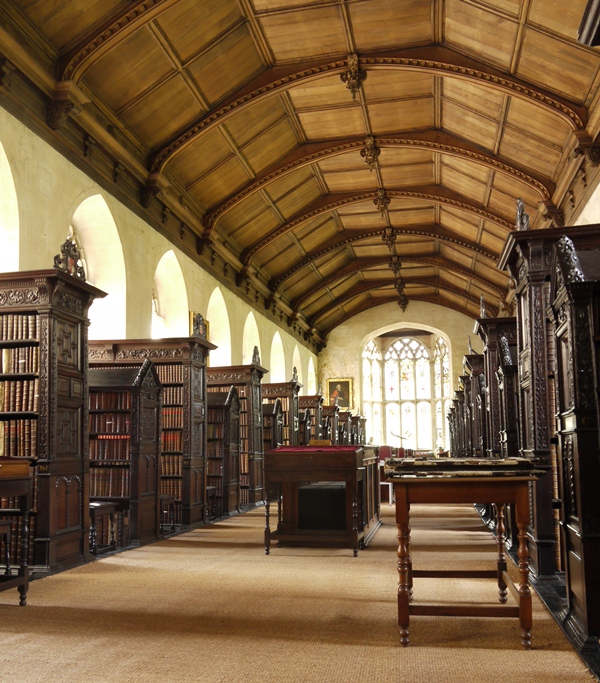 St John’s College Library is made up of two distinct parts – the Working Library which provides resources for current students, and the Old Library which contains rare books and special collections of the College. It is one of the largest college libraries in Cambridge, with holdings of over 100,000 volumes, and serves approximately 800 students. The graduate trainee is part of a large library staff team of currently 14.
St John’s College Library is made up of two distinct parts – the Working Library which provides resources for current students, and the Old Library which contains rare books and special collections of the College. It is one of the largest college libraries in Cambridge, with holdings of over 100,000 volumes, and serves approximately 800 students. The graduate trainee is part of a large library staff team of currently 14.
The graduate trainee’s working day is very flexible with direction largely provided by the trainee themselves. The graduate trainee is involved in both the day to day running of the library as well as special projects dictated in part by their own interests. Work which trainees cover during their time at St John’s, and then do varying amounts of depending on their interests, includes:
- Cataloguing and classifying: The graduate trainee is taught how to catalogue to international standards (RDA) and classify using the Library of Congress classification scheme.
- Rare books and special collections: There are plenty of opportunities for working in amongst the rare books and special collections, either on special projects, or just generally learning how to handle and care for rare books and manuscripts, and answer academic enquiries
- Issues, returns and enquiries: The trainee is often responsible for covering the issue desk where they deal with issuing and returning books and act as a first contact point for students and visitors to the Library.
- Shelving: The library assistant is primarily responsible for daily shelving, however during particularly busy times the graduate trainee is expected to take on a share of the shelving.
- Biographical enquiries: The graduate trainee is able to take on some of the biographical enquiries that the College receives. This involves various tasks, and can prove very interesting.
- College Archive Centre: Once a week, the graduate trainee invigilates in the reading room of the new College Archives (opened in October 2014). They also work alongside the Archivist in the cataloguing of items, ranging from minute books to club ties.
 The graduate trainee is usually given the opportunity to put on an exhibition in the Library’s exhibition space, which generally relates to special collections material. Recent trainees’ exhibitions have covered Johnian medics and medicine, the diaries of Cecil Beaton, collections of Hugh Wharton Gatty, paintings and works of Samuel Butler, and the Grand Tour. Furthermore, if you are interested in rare books you will have the opportunity to pursue a project in the Old Library. Previous graduate trainees have helped to catalogue special collections and index the images within our manuscript collection.
The graduate trainee is usually given the opportunity to put on an exhibition in the Library’s exhibition space, which generally relates to special collections material. Recent trainees’ exhibitions have covered Johnian medics and medicine, the diaries of Cecil Beaton, collections of Hugh Wharton Gatty, paintings and works of Samuel Butler, and the Grand Tour. Furthermore, if you are interested in rare books you will have the opportunity to pursue a project in the Old Library. Previous graduate trainees have helped to catalogue special collections and index the images within our manuscript collection.
The trainee at St John’s College is able to experience most of the aspects of library work found within an academic library and is free to pursue interests which they develop during the year while contributing to the daily running of the Library.
Visit St John’s College Library website to find out more.
top
Trinity College Library: The Job
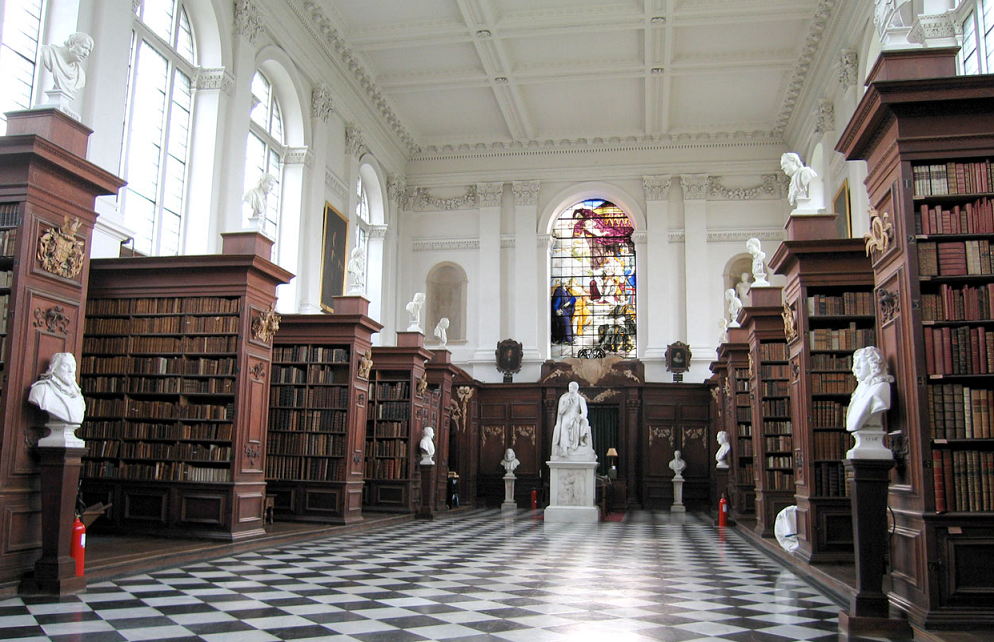 Trinity College Library is the largest of the Cambridge college libraries with a total book stock of some 300,000 volumes and a large library team. It comprises the Student Library, where the modern collections are held, and the Wren Library, which was completed in 1695 to the design of Sir Christopher Wren and houses significant manuscripts, rare books, and other special collections.
Trinity College Library is the largest of the Cambridge college libraries with a total book stock of some 300,000 volumes and a large library team. It comprises the Student Library, where the modern collections are held, and the Wren Library, which was completed in 1695 to the design of Sir Christopher Wren and houses significant manuscripts, rare books, and other special collections.
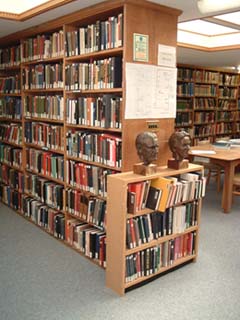 The trainee at Trinity is fully involved in the everyday running of the library as part of the staff rota, as well as having various individual responsibilities to fulfil. These include:
The trainee at Trinity is fully involved in the everyday running of the library as part of the staff rota, as well as having various individual responsibilities to fulfil. These include:
- Desk Duties: There are three main desks within the library and daily involvement in all three ensures that days are varied. First, there is the Issue Desk – the main port of call for the College library – where the traditional library duties of issuing, returning, and stamping books exist alongside dealing with face-to-face queries and answering and transferring telephone calls. Next, there is the Wren Reception which deals with the registering of rare books readers as well as supervising and answering the queries of visitors to the historic library. Finally we have the Wren desk, which is located at the other end of the library to the reception, hidden behind the magnificent statue of Lord Byron. Here, duties include the direct assistance of readers with rare books and materials, ordering items to be fetched for them, and checking back manuscript material once they have finished.
- Fetching: There is also a slot on the rota for ‘mobile.’ It is the main duty of the member of staff scheduled for this work to be at the constant beck and call of the Wren Desk. They are either allowed to continue with their own work, or encouraged to use this time to help with the digitisation project, scanning delicate rare materials in preparation for online publication, but must be constantly available to fetch any material that readers working in the Wren may wish to view. It is also usually the responsibility of this person to engage in any clerical routines such as shelving, photocopying, or spiral binding.
- Cataloguing and Classification: A main, ongoing duty of the graduate trainee is the cataloguing and classification of new books. Training is provided both through cataloguing courses at the UL with the other graduate trainees and sessions with the Assistant Librarian on the particular library management software used at Trinity. These sessions also help the trainee get to grips with how books are classified. For most of the year new books are restricted to those requested by students and staff, but in September it can be extremely busy.
- Supervision of the Law Reading Room: The trainee is solely responsible for the day-to-day supervision of an offsite law reading room. It is generally necessary to visit a few times a week in order to shelve new law texts and journals, as well as removing and replacing out-dated textbooks.
- Rare books and special collections: There are many and varied opportunities to work with the rare books and special collections, including fetching and checking materials and dealing with various enquiries. There is also the opportunity to work on special projects with these collections depending on interests. For example, previous trainees have been taught how to catalogue older works and have been encouraged to curate their own exhibitions to display in the Wren.
- Clerical routines: Filing, labelling, spiral binding, and photocopying are among the regular duties of the trainee.
Work on a special project during the trainee year is also encouraged and can vary according to the interests of individual trainees or to ongoing projects within the library. Previous projects, for example, have included an exhibition, the digitisation of manuscript images, large-scale item record creation, and the identification of manuscript and rare book items in the collections for the development of current on-line databases.
Training is provided throughout the year. Usually, the first week is spent with the out-going trainee to enable the newcomer to find their feet. Thereafter training is provided on a number of staff duties, cataloguing and classification, acquisitions, archives, collections management, and so forth by various members of the staff. Additionally, there are relevant courses and talks provided by the University and other organisations in Cambridge and beyond which the trainee is encouraged to attend.
Visit Trinity College Library website.
Corpus Christi College: The Taylor Library: The Job
Corpus Christi College has two distinct libraries. The Parker Library is home to the college’s rare books and manuscript collections, including one of the world’s largest collections of Anglo-Saxon manuscript material. The Taylor Library is the colleges’ working library, and aims to provide core materials for all undergraduate courses taught at Corpus. My post is mainly based in the Taylor Library.
Completed in 2008, the Taylor Library is one of the most modern college libraries in Cambridge. Architecturally it is quite unusual, being almost a building-within-a-building. The outer shell of the Library is a former bank, which was hollowed out and (in a Grand Design of which Corpus graduate Kevin McCloud would surely approve) had its innards replaced with a three storey structure in American Oak. This provides desk space for 100 students at a time, all with a personal light, plug socket and internet connection.
The former front door of the bank now houses the Corpus Clock, one of the most distinctive landmarks in Cambridge, which is almost permanently surrounded by admiring tourists. The cunning layout of the Library interior, however, means that the students working hard within are protected from prying eyes. It is fantastic to work in such a modern, purpose built environment.
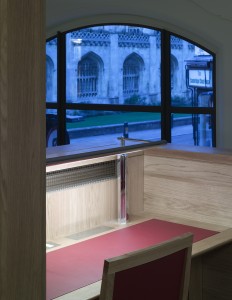
The Taylor is run by the smallest possible team – the Taylor Librarian and the Graduate Trainee Librarian. We are very fortunate to have space within the Library and are at present growing the collection. We currently hold around 37,000 volumes, and the Library has an estimated upper limit of 45,000. Therefore, a lot of our time is spent checking reading lists and ordering, accessioning, cataloguing, checking and processing new books. We also take requests from students and in the vast majority of cases will be able to promptly provide them with the material they need. We have a display area for newly arrived books, to ensure students are kept aware of what is now available. We also remove and deaccession material to ensure that our collection is up to date and relevant.
The Library is 24-hour and was one of the first in Cambridge to have a self-borrow station. We manage bookings of the Girdler’s Room for seminars and tutorials and of the state of the art Media Room. We will offer an afternoon tea to students during Exam Term, giving them a welcome respite from their studies.
ARU Library: The Job
The library at ARU’s Cambridge campus is a large, modern space spanning four floors, designed to support all different kinds of study. Serving over 10,000 students across a broad range of disciplines, the Graduate Trainee joins a large team at Cambridge of over 20 library staff, and is part of the wider Student and Library Services Directorate. Library resources are shared across all three ARU campuses (Cambridge, Chelmsford, and Peterborough), so ARU students have access to a combined total of over 250,000 books (including print and e-books) and over 30,000 journal subscriptions, as well as around 200 subject specialist databases. There is also an extensive collection of music scores, CDs, and DVDs, and a number of historical primary sources such as correspondence and newspapers.
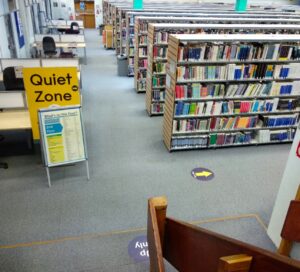
At ARU the Graduate Trainee is primarily part of the Customer Services Team, and will therefore contribute to providing customer-focussed front of house library services. The trainee’s main duties include, but are not limited to:
- Responding to in-person and remote customer enquiries, providing advice, guidance and support across the full range of University Library services, including online information resources and relevant University-wide systems and services
- Checking reading lists, liaising with Subject Librarians, and ordering and receiving new books
- Troubleshooting IT issues to the appropriate level, and making referrals to IT Services where necessary
- Undertaking work relating to the library’s collections of books and other materials, including loan and request services, stock presentation, and stock audit duties
- Delivering a programme of staff training and learning opportunities as part of the Learning & Development Team
Like the other Cambridge traineeships, the Graduate Trainee at ARU has the opportunity to engage with an extensive programme of training, visits, and other developmental activities.
Visit the ARU Library website.
